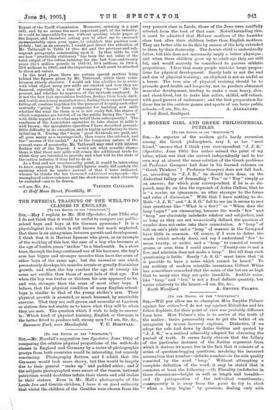you allow me to champion Miss Smythe Palmer against her
critics ?—I do not say against Eubulides and his fellow-Sophists, for their point of view was probably different from hers. Miss Palmer's aim is to arrive at the truth of the matter ; theirs presumably was to get the better of an antagonist by means however captious. Dialectics, if we adopt the rule laid down by Aulus Gellius and quoted by "J. J. R.," is a method admirably adapted for obscuring the pursuit of truth. It seems fairly obvious that the fallacy of the particular instance of the Sorites argument from which it derives its name lies in the fact that it consists of a series of question-begging questions, involving the incorrect assumption that number—definite number—is the sole quality connoted by the word " heap." Without attempting a complete definition of the word, it may be stated that it connotes at least the following :—(1) Plurality {indefinite) in three dimensions—height as well as length and breadth— and (2) juxtaposition of the individual constituents ; consequently it is away from the point to try to elicit " when a heap begins " by questions dealing only with
number. With regard to " fewness " the case is different ; ' the fallacy here is the ascription to a vague subjective impression of the definiteness and capability of measurement of most objective facts. If Eubulides had met a man with ten thousand hairs on his head, he would, or would not, have decided that the man had few according to his own personal equation at the time. If shortly afterwards he had met another man with nine thousand nine hundred and ninety- nine, his opinion in this case would have depended, not on the relative numbers of the hairs possessed by the two men, but, as before, on his own subjective conditions. It is quite possible that he might have decided that the former bad few hairs,' and that the latter had not few. The answer to "A. S. G.'s " questions about noises is that, in the first place, there are stimulations of the central auditory apparatus that fail to produce a conscious sensation of sound ; and secondly, that a summation of such stimuli may produce a conscious sensation. I cannot explain bow this happens—it is the old problem' of mind and body—but the fact remains that it does happen. The number of "inaudible noises" needed to produce an "audible noise" will vary with the force of the individual stimuli and the auditory acuity of the hearer. The Sorites method is applicable only within very narrow limits ; within those limits it is clumsy, and an attempt to apply it outside them results naturally in confusion. A further example of the subtlety of the Sophists in endeavouring to obscure the pursuit of truth by the use of unsuitable methods is afforded by the puzzle of Achilles and the tortoise. This was apparently meant to demonstrate that Achilles never caught the tortoise. What it really points to is that between the numbers ninety and one hundred can be inserted an infinite number of terms of a descending geometrical progression, of which the first term is ninety and the ratio one-tenth ; but an inquiry on more rational lines is needed to show this clearly. In conclusion, let me express a hope, as against " A. S. G.," that Miss Palmer will not too soon reverse her judgment. Fortunately, neither captious dialectics nor scientific logic can extinguish youth.—I am, Sir, &c., TESTUDO.
[We are entirely on the side of Miss Palmer, who showed great acumen in her exposure of the Sophists' puzzle. Un- fortunately, however, not all the world is so acute as she, as we are at this moment realising in the region of politics. The Prime Minister at one time had a "heap" of Free-trade principles. These he has permitted to be taken from him one by one by Mr. Chamberlain, and now none remain. Yet because a heap of principles minus one is sometimes still a heap, though a diminished heap, many of Mr. Balfour's fol- lowers contend that he must still be a Free-trader. Even Mr. Chamberlain's uncontradicted assertion that the whole heap is now in his pocket does not affect them. They only say: " How can the heap of Free-trade principles have gone, since only one principle at a time was withdrawn, and since a heap of principles minus one principle is still a heap ? "—En. Spectator.]



















































 Previous page
Previous page